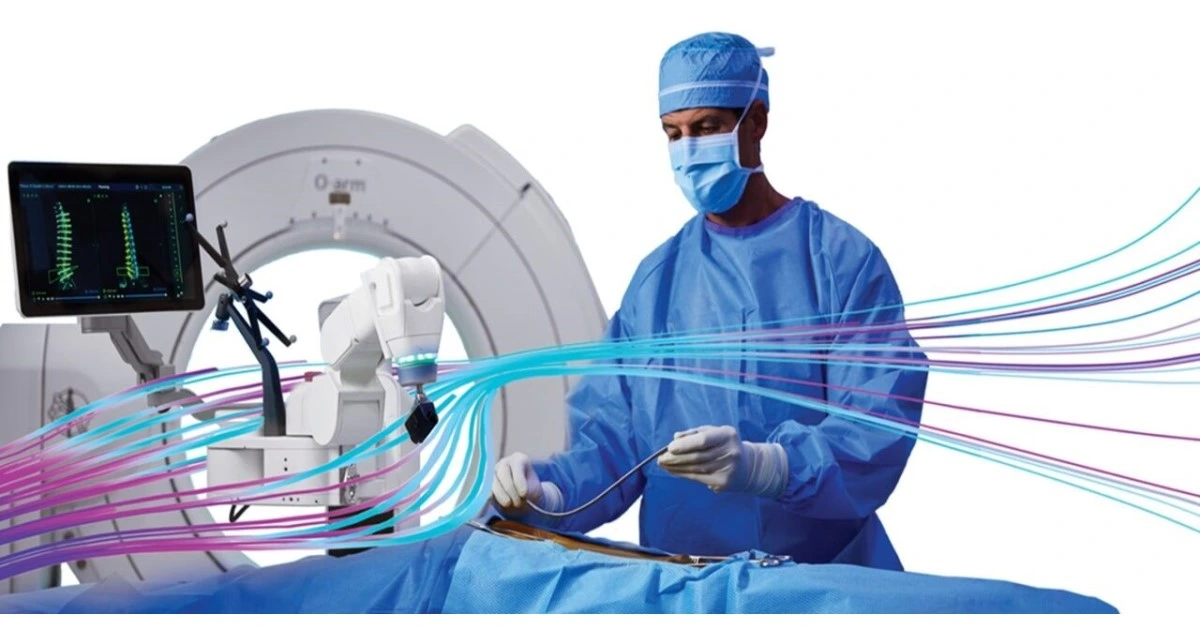
IRELAND – Global healthcare technology leader Medtronic has announced a series of software, hardware, and imaging upgrades within its AiBLE smart ecosystem, aimed at transforming spine and cranial procedures with improved precision and reliability.
With these advancements, Medtronic aims to elevate the precision and reliability of spine and cranial procedures by integrating advanced robotics, imaging, and artificial intelligence (AI).
The collaboration with Siemens Healthineers will further expand access to leading-edge imaging technologies, paving the way for enhanced surgical outcomes.
Medtronic’s AiBLE ecosystem brings together advanced robotics, imaging, AI, and implants for comprehensive spinal and cranial surgical support.
The ecosystem’s recent updates focus on optimizing every stage of surgery, from planning to execution.
O-arm 4.3 Software: With enhanced navigation and the longest 3D scan length in cone-beam CT imaging, the O-arm 4.3 software improves visualization while lowering radiation exposure, allowing surgeons to make real-time adjustments during procedures.
UNiD Adaptive Spine Intelligence (ASI): Leveraging computer vision, UNiD ASI segments, labels, and measures critical MRI data, particularly for lumbar pathologies. This automatic MRI analysis expedites the planning phase, helping surgeons develop tailored treatments.
Mazor Robotic Guidance System: The Mazor system enables meticulous preoperative planning and intraoperative precision, providing robust support for procedures that include screw, rod, and bone placement.
ModuLeX Spinal System: Designed for flexibility and optimized patient outcomes, ModuLeX enhances surgical visualization and adaptability, giving surgeons the control to build custom constructs for individual patients.
Strategic collaboration with Siemens Healthineers
The partnership between Medtronic and Siemens Healthineers focuses on integrating Siemens’ advanced Multitom Rax imaging system with Medtronic’s AiBLE ecosystem to enhance diagnostic and surgical processes in spine care.
This partnership between Medtronic and Siemens brings added precision to surgical planning, helping reduce the risk of complications and shorten recovery times.
According to Skip Kiil, President of Medtronic Cranial & Spinal Technologies, this collaboration “advances our commitment to reduce variability and improve outcomes for spinal patients” by combining the expertise of both companies in imaging and robotics.
The Multitom Rax system supports detailed, weight-bearing imaging for musculoskeletal conditions, which aids surgeons in identifying spinal issues more precisely.
Siemens Healthineers’ executive vice president of X-ray products, Verena Schoen, added, “Multitom Rax provides geometrically accurate images which allow precise measurements of the patient’s vertebrae, contributing to faster diagnosis and treatment planning.”
Market and industry context
With the growing demand for advanced medical technology, Medtronic’s spine segment saw a 7% growth in fiscal Q1 2024.
Competitors like Johnson & Johnson and Stryker are heavily investing in robotics and surgical solutions, indicating a vibrant and expanding market for spinal and musculoskeletal healthcare.
In the broader imaging sector, the U.S. market for medical imaging, valued at $9 billion in 2023, is projected to reach US $10.9 billion by 2030, underscoring a competitive field where Siemens Healthineers plays a significant role.
Siemens Healthineers leads in MRI and CT imaging, while Medtronic dominates in patient monitoring technology, positioning both companies as key players in this high-growth sector.
The spinal surgery segment is particularly ripe for innovation, driven by the need for solutions that reduce recovery times and minimize surgical risks.
XRP HEALTHCARE L.L.C | License Number: 2312867.01 | Dubai | © Copyright 2025 | All Rights Reserved